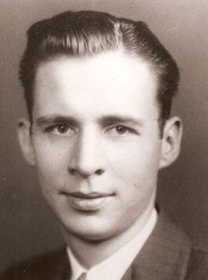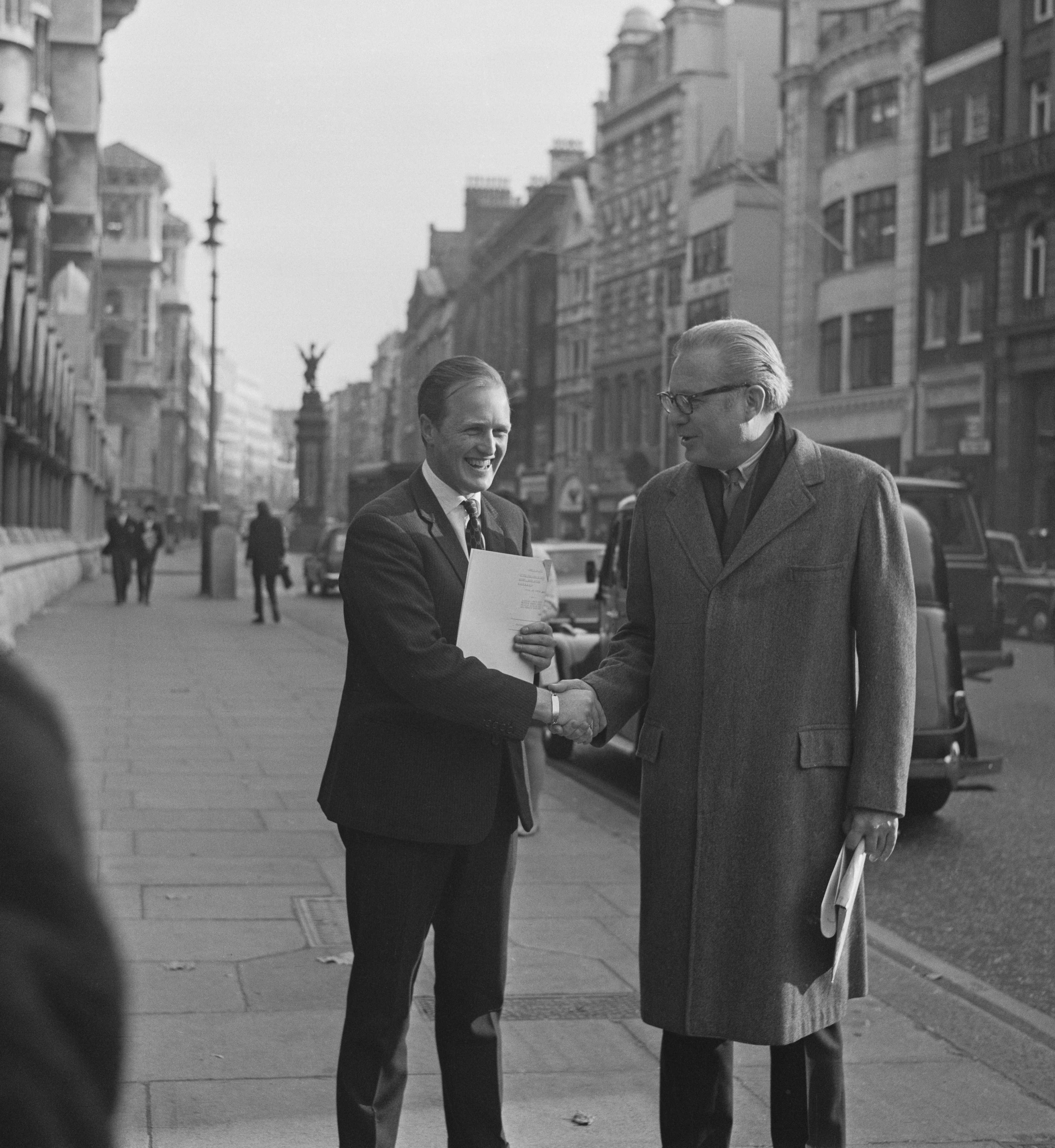Miles Axe Copeland Jr. was a highly intelligent, yet rambunctious founding member of the Central Intelligence Agency. It was most likely these qualities that opened the door to the spy agency at a time when most employees relied on their Ivy League educations for acceptance. The fact that he could speak ten languages, including Arabic and French, also helped.
Miles’ first love was jazz, and he made a successful early career as a musician. His sons followed in his musical footsteps, including Stewart Copeland, the drummer for Sting and the Police.
When World War II broke out, Miles joined the fight and soon found himself immersed in the world of intelligence. He was notorious for playing (and creating) games, including participating in war game simulations and (unofficially) testing military security protocols.
Later in his career, he also found time to pursue several other passions, including writing, and he documented his many adventures in several books.

Sightseeing in Beirut in the 1950’s. CIA officer Miles Copeland Jr., daughter Lennie, and son and future Police drummer Stewart Copeland.
“Man in a Suitcase” – Miles Discovers His First Love, Jazz
Born in Birmingham, Alabama in 1916, Miles was frequently sick as a young boy, at one point being confined to his house for two years before recuperating enough to go out. Despite his early childhood illnesses, Miles grew into a tall man, standing six foot three and topped with thin blonde hair.
Miles’ family had already mapped out his future for him. He would attend the University of Alabama (UA), study science and medicine, and follow in his father’s footsteps and become a physician. But it was at UA in 1940 where Miles discovered a new passion: music.
Against his family’s wishes, Miles dropped out of college, picked up a trumpet, and was obsessed with becoming a swing jazz musician. He was fairly successful, scoring gigs playing with and composing for the likes of Ray Noble, Benny Goodman, Glenn Miller, Stan Kenton, Dave Brubeck, and Buddy Rich. He enjoyed his profession as a jazz musician more than any other career he had.
But then Pearl Harbor happened, and his life’s direction would change once again.

Miles Copeland, Jr. A Jazz musician, OSS intelligence officer, CIA ops officer, and the father of a musical dynasty.
“When the World is Running Down” – Miles Becomes a Spy
With the outbreak of WWII, Miles joined the U.S. Army working in the divisional Finance Office of the National Guard Armory. He took the Army General Classification Test (similar to an I.Q. test) and scored incredibly high, so high in fact that the Army suspected him of cheating.
They instructed him to retake the test, which he did, and scored even higher.
This drew the attention of General William “Wild Bill” Donovan, the director of a new, mysterious Agency in Washington: the Office of Strategic Services, America’s first spy agency.
Donovan was known for his penchant to recruit characters from all different walks of life for the OSS, including Ivy League graduates, forgers, artists, journalists, and military services members, to name a few. He was impressed not only by Miles’ high level of intelligence, but also by the prospect that Miles had somehow gamed the system.
According to Miles’ son, Stewart, his dad had “the gift of gab” which likely drew the attention of Donovan as well. “He was a fast talker and was fun to have around.”
Donovan sent Miles to London to direct an OSS Counter Intelligence school, a position which earned him the Legion of Merit. He took a commando training course in the Scottish highlands and proceeded with his usual antics—testing security by stealing a safe from the U.S. Army headquarters.
Miles loved games—he was a “gamer” before the term entered the common vernacular—and he indulged his gaming interest by partaking in the Grosvenor Square war games designed to predict the German’s response to the Allied invasion of northwest France.
During his time in Europe, Miles crossed paths with notables such as Boris Pash, an officer affiliated with the U.S. Manhattan Project, and with the famous author, Ernest Hemingway.
As the war wound down, Miles was tasked with writing a history of U.S. counterintelligence activities in Europe, an assignment that required him to interview various Nazi scientists and spies. He also interrogated German counterintelligence officers to determine which of the British and American spies they had captured and executed, or turned against us.
“Tea in the Sahara” – Welcome to the CIA
In 1945—when the Truman administration dismantled the OSS—its analytic, collection, and counterintelligence functions were transferred to the State and War departments. Renamed the “Strategic Services Unit,” Miles stayed with the organization throughout this and additional transitions, and he assisted in creating the blueprints for the CIA when it was established in 1947.
Once the fledgling agency was established, Miles soon became “our man in the Middle East” with his first CIA posting. Between 1949 and 1957, he recruited local agents and established networks throughout the Middle East.
Miles retired from the CIA in May 1957 to start Copeland & Eichelberger, an industrial consultancy and public relations firm in Beirut, Lebanon.
Miles continued working in the intelligence realm and became a known Middle East expert. Though his expertise (and ego) would conflict with many at Langley, by 1970 Miles stepped away from intelligence work and turned to writing articles and books (some of them to the ire of CIA), including Without Cloak or Dagger: The Truth About the New Espionage (1974) and The Game Player: Confessions of the CIA’s Original Political Operative (1989).

British Conservative Party politician and journalist Winston Churchill (1940-2010) stands on left with American businessman and intelligence expert Miles Copeland Jr (1916-1991) outside the Royal Courts of Justice on the Strand in London, 25th November 1970. (Photo by Evening Standard/Hulton Archive/Getty Images)
“Walking in Your Footsteps” – How A CIA Officer Fathered a Musical Dynasty
When Miles wasn’t busy recruiting spies and writing books, he spent time with his large family.
He met his wife Lorraine Adie early in his career at an English Speaking Union reception for U.S. troops during WWII. The daughter of a neurosurgeon, she was also an intelligence officer, employed by the British Special Operations Executive. She later became a successful archaeologist. Their only daughter, Lorraine (Lennie) is a film producer.
They also had three sons—Miles III, Ian, and Stewart—all of which have had successful careers in the music industry.
Miles III learned to speak Arabic at an early age as his father’s CIA career took him to posts in the Middle East. In 1962, Miles III thought about following in his father’s footsteps and applying to the Agency, even returning to his father’s roots and attending college in Alabama.
Miles III rejoined his family in the Middle East and from 1966 to 1969, he earned a degree in economics from the American University in Beirut. While there, he offered to help promote a struggling musician looking for gigs. It was the first spark of a future that echoed his father’s first love: music.
When Miles Jr. left intelligence work in 1970 and moved his family to England, his sons began to explore the burgeoning music scene in London.
In the early 1970s, Miles III approached a number of English rock and pop bands and formed his own management agency and record label; British Talent Management (BTM) and signed a number of progressive rock acts such as Squeeze, Renaissance, and Curved Air.
By 1975, Miles III added his kid brother, Ian, to his team and together they organized multi-band music festivals and rock tours throughout Europe. By the late 1970s, Miles III was in the perfect place to see the punk/new wave bands taking over the London music scene.
Meanwhile, younger brother Stewart picked up the drumsticks and jammed with a number of British indie bands.
My childhood wasn’t a regular upbringing. We moved around the Middle East and mixing with so many fascinating people. I shared my father’s passion for music, which eventually led to my career with The Police and beyond, and his job shaped me, too. In sharing his story, and my family’s story, I hope to shed light on what it is truly like to be the son of a CIA agent.
from his podcast, “My Dad the Spy”
Stewart Copeland
Though born in Alexandria, Virginia in 1952, young Stewart Copeland would spend his formative years in the Middle East as his father continued his CIA career. Years later, Stewart would confess his drumming style was definitely influenced from his early exposure to Arabic rhythms.
In 1977, Stewart met a former schoolteacher named Gordon Sumner, who now called himself Sting—due to the yellow and black sweater he wore that resembled a bee—and formed a band that in five years would take the music world by storm.
In 1978, Miles III offered to manage Stewart’s then-struggling band, The Police. Taking his younger brother’s band under his wing, Miles III turned the three-man power pop band into a phenomenon. The group became one of the biggest bands of the 1980s, peaking with a concert for 70,000 people at Shea Stadium and a string of number one singles including “Every Little Thing She Does is Magic” and “Every Breath You Take.”
The success of managing The Police enabled Miles III to create I.R.S. (International Record Syndicate) Records, an offshoot of A&M records. Miles III signed up some of the biggest indie bands of 80s, including R.E.M., The Go-Go’s, Fine Young Cannibals, The English Beat, and The Bangles.
The I.R.S. “Spy Guy” logo was an obvious nod to his CIA father.

“Spy Guy” – I.R.S. Records logo. A nod to his father the spy.
In 1986, Miles Jr. gave an interview to Rolling Stone magazine. By then all of his sons were music industry powerhouses, but the interview was not about music. The interview was about Miles Jr.’s life as a CIA officer in the Middle East between 1947 through 1957.
Much to Stewart’s ire, Miles Jr. joked to the reporter that The Police was created as a CIA psyop to mold young minds.
“It really pissed off Sting,” Stewart would remark, “that my father would joke like that, but that was my old man. A company man to the very end!”
